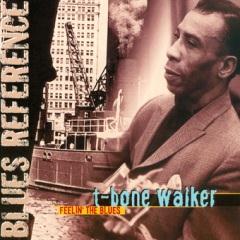T-Bone Walker - Feelin' The Blues (1999)
T-Bone Walker - Feelin' The Blues (1999)

1. I Hate To See You Go - 3:41 2. Ain't That Cold Baby - 6:33 3. Someone Is Going To Mistreat Me - 3:26 4. Leavin' You Behind - 4:15 5. Feelin' The Blues - 6:11 6. I Want A Little Girl - 5:04 7. Late Blues - 5:54 8. Gee Baby Ain't I Good To You - 4:27 9. Kansas City - 3:43 10. Confessin' The Blues - 3:52 11. Hands Off - 3:18 12. Wee Baby Blues - 3:18 13. Please Send Me Someone To Love - 4:11 Alto Saxophone – Eddie "Cleanhead" Vinson (tracks: 12, 13) Bass – Jacky Samson (tracks: 1 to 8), Roland Lobligeois (tracks: 9 to 13) Drums – Paul Gunther (tracks: 9 to 13), S.P. Leary Guitar – T-Bone Walker Lead Vocals – Eddie "Cleanhead" Vinson (tracks: 12, 13), Jay McShann (tracks: 9 to 11), T-Bone Walker (tracks: 1 to 8) Organ – Georges Arvanitas Piano – Georges Arvanitas, Jay McShann (tracks: 9 to 11), T-Bone Walker (tracks: 2) Tenor Saxophone – Hal Singer
T-Bone Walker, who died on March 16, 1975, may be forgotten by the wider public, but he remains one of the most innovative and influential musicians of the 20th century.
He was the first person to play blues on an electric guitar and led the way for the late blues maestro BB King, who said: “When I heard T-Bone Walker play the electric guitar I had to have one.”
As well as being a remarkable musician, Walker was one of the great showmen. Even in the Forties, he would perform stage acrobatics such as the splits. Walker did almost everything that Jimi Hendrix did later, from exploiting feedback to playing the guitar behind his back to playing his guitar with his teeth. No one of Walker's era would have set a precious guitar on fire, however, so Hendrix must have learned that one from someone else.
Chuck Berry was another musician who learned his stagecraft from Walker. "All the things people see me do on the stage I got from T-Bone Walker,” says Berry, the master of the stage duck walk.
But he should be remembered for more than just being an insatiable showman. Aaron Thibeaux Walker, who was born on May 28 1910, in Linden, Texas, was a major innovator of Texas Blues, Chicago Blues, Jump Blues, and West Coast Blues. He was a splendid singer and songwriter, too, who was equally adept at playing the piano, banjo, ukulele, violin and mandolin.
Walker was of African-American and Cherokee descent. His parents, Movelia Jimerson and Rance Walker, were both musicians and his nickname was given to him by an aunt (he had originally been called T-Bow). Walker was playing music from the age of five and was inspired in his early teenage years by the blues singers Ida Cox and Leroy Carr, Lonnie Johnson and Bessie Smith. "Bessie Smith is my favourite girl blues singer," Walker recalled in a 1947 interview. "Ma Rainey could sing the blues, but she couldn't sing the blues like Bessie. They had different styles. Bessie was the queen for everybody, better than Ethel Waters."
His golden period was between 1946 and 1950. Walker played regularly at the Rhumboogie club in Chicago and when it closed, at the end of the Second World War, the owner started Rhumboogie Records. Walker was one of the first artists to record for the label. The 10 songs he cut for that label got him noticed and in 1946 he signed to the more powerful Black And White Records.
Call It Stormy Monday (But Tuesday Is Just as Bad) was recorded in September 1947. This was to become the most famous of Walker's songs and has been covered by numerous musicians including Bobby Bland and The Allman Brothers. In this same period Walker recorded Inspiration Blues, T-Bone Shuffle, Go Back To The One You Love, Bobby Sox Blues, I’m Still In Love With You and West Side Baby.
Listen afresh and you will hear Walker had a sound and playing style all his own; unique phrasing with smooth and melodic staccato runs. He played solos that brought the guitar out of its role as an accompanying, rhythm-oriented instrument. He was one of the first musicians who proved that a guitar could go head-to-head with brass, pianos and woodwinds as a legitimate solo instrument.
Although his success back home in the Sixties was limited, he delighted audiences wherever he played and toured Europe regularly. Walker visited England several times during the decade (playing at big venues such at the Hammersmith Odeon and small ones such as the Wyvern Ale House in Leicester).
Walker had one last triumph up sleeve, when his album Good Feelin′ won a Grammy Award for Best Ethnic or Traditional Folk Recording in 1971.
Walker had a stroke in 1974 and died, aged 64, of bronchial pneumonia following another stroke in March 1975. He remains a man who changed the face of music and is still celebrated in Texas every year with the T Bone Walker Blues Festival. As he said himself, a quote used in the original Telegraph obituary (printed below): "I played sweet blues." --- Martin Chilton, telegraph.co.uk
download (mp3 @320 kbs):
yandex 4shared mega mediafire uloz.to cloudmailru
